Her Mother’s Daughter
Chelsea Clinton Answers Questions at Santa Barbara City College
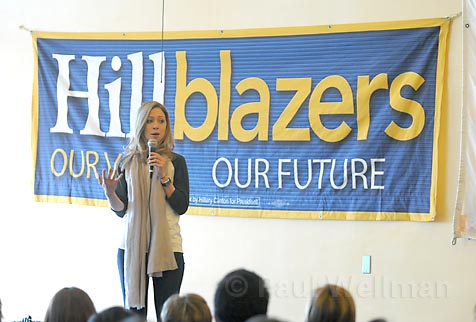
Skipping the speech, Chelsea Clinton simply stood and delivered answers to questions from about 300 students and others who came to hear her in the Santa Barbara City College cafeteria on Friday afternoon, February 1, four days before the California primary. The White House raised, 27-year-old daughter of would-be president Senator Hillary Clinton and former president Bill Clinton wowed even Obama campaign volunteers with her detailed understanding of the issues coupled with her tendency to describe them more concisely than either of her policy wonk parents. “I was very impressed,” said David Philippides, an SBCC biology student wearing an Obama pin. Philippides said Chelsea Clinton’s presentation reinforced his sense that her mother was competent to lead the country, but that he still felt that Obama would do more to transform the country.
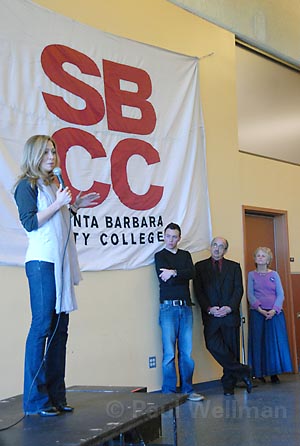
“I want to make my mom’s campaign accessible to you as you decide who to support,” Chelsea Clinton told the audience. Nonetheless, she curtly deflected the second question put to her. It was from a young man seeking Chelsea’s personal opinion of her mother’s 2002 vote for the resolution authorizing President Bush to attack Iraq if he deemed it necessary. It is a vote that Hillary has found herself explaining throughout the primary campaign. “This is not about me,” Chelsea Clinton responded. “You should make your judgment . . . based on what she has said.”
On other matters Chelsea was more forthcoming. On the topic of education, she said that her mother “unequivocally will end the unfunded federal mandate known as No Child Left Behind,” and quickly explained a fundamental problem with that stick-heavy effort to improve schools: In practice, a classroom’s average test score may improve from a level “2” to level “4” over the course of a year, but if the passing score is “5,” the students are considered to have failed. “That’s not the right message to send,” Chelsea Clinton said, “and it’s no incentive for anything but to lower standards or teach to the test.” Other questions arose about educational needs, including arts instruction. Reminding the audience that her mother has been a staunch defender of the National Endowment for the Arts, against President Bulsh’s attempts to scale down support for performing troupes and theater buildings as well as afterschool arts programs. Once they are out from under the financial burden of administering No Child Left Behind, Chelsea advised, “I urge you to talk to your school districts about where you want that money invested.” She praised her mother’s co-authorship of a law entitling all disabled students to a public school education, but said that whereas the federal government is supposed to cover 40 percent of that cost it is only paying 17 percent, a shortfall that she promised her mother would correct.
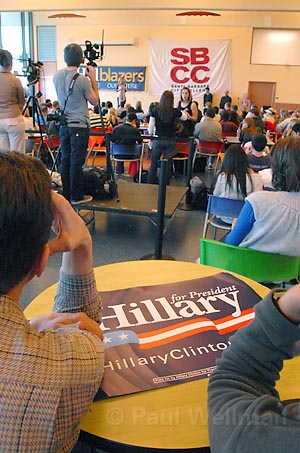
Responding to a question about whether Hillary’s opponent Barack Obama was more likely to mobilize young voters, Chelsea noted that her mother had swayed the younger demographic in Florida, and she enumerated interests that transcend age differences: from ending the Iraq war to dealing with the big picture of environmental, economic, and security issues. She outlined her mother’s economic stimulus package which calls for a home foreclosure moratorium and five-year interest rate freeze. The Clinton daughter zeroed in on the brass tacks of mother’s plan to ease college debt by limiting loan payments to 15 percent of disposable income and expanding credit toward repayment for those who practice their professions in needy areas after graduation. The Stanford graduate said that lots of her friends would be “happier and more fulfilled” if they could do that but were deterred by the need to service their college loans.
“Tell me why your mom’s going to have the political juice to stand up to the military industrial complex,” demanded Wilson Gil, a musician wearing a Willful Sinners T-shirt who said he had recently returned from performing for the troops in Iraq. Clinton responded that as a member of the Armed Services Committee her mother had championed an initiative to end no-bid contracts, that she supports public financing of campaigns, and that she stood up to her Wall Street constituents regarding mortgage financing.
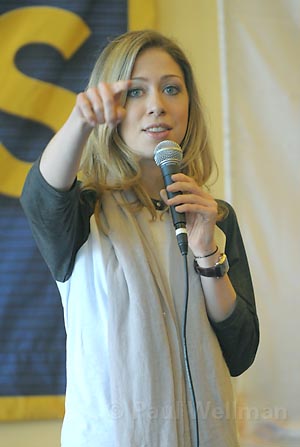
An Obama supporter wanted to know why her mother should get a second chance to bring about universal health care, especially now that she receives campaign contributions from pharmaceutical lobbies. Even though her mother’s efforts, as First Lady, were defeated ‘by corporations that spent $93 billion to good effect,” Chelsea responded, her mother has kept fighting and effected a few reforms. “The special interests won the battle,” Chelsea said, “but she’s going to win the war.” Chelsea added that everyone running has accepted money from lobbyists.
Since Hillary Clinton’s first attempt at health care reform she has learned a lot more about working with diverse interests, her daughter added. “We’re never going to get universal health care unless we fashion a coalition,” Chelsea said, with everybody from pharmaceutical companies and insurers to doctors and nurses. Asked why her mother does not champion a single-payer system, she answered that her mother “wants to respect the fact that people [who have insurance] are happy enough, at best, or in some cases very happy with their health care.” As for the millions who are not covered, she quickly summarized the tax credits and other assistance that would result in everybody’s being covered.
One student asked if her mother would decriminalize medical marijuana. The response was that her mother doesn’t believe in spending money on federal raids of dispensaries sanctioned by states and municipalities.
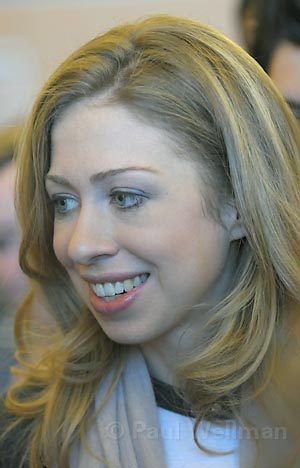
Some of the questions seemed to play right into the young Clinton’s hands, such as one about simplifying the tax code. Chelsea was ready to tick off details: Her mother would reduce the application for federal college aid to a simple box. She would also repeal oil tax breaks and use the money to invest in green technology. She would eliminate tax breaks for companies who move their operations overseas. She would return to the tax rates of the 1990s for those making more than $250,000 annually; she would raise taxes on the 0.3 percent of families making more than $7 million annually and use that money to fund college affordability.
After Clinton left the podium, only to be surrounded by a mob of photographers from both the press and the public, student Andrew Grigsby, an undecided voter, said, “I’m happy I came today and I feel like a learned quite a bit.” He said liked the way the Clinton daughter carried herself, her intellectual strength, and her persuasive powers, but he still didn’t know who he’d vote for. He regretted missing Obama’s presentation at SBCC, and Hillary Clinton’s appearance at UCSB, and the televised Clinton-Obama debate the previous evening. “I think I will be studying YouTube over the weekend,” Anderson said. “I’m powered up and ready to vote on Tuesday.”



